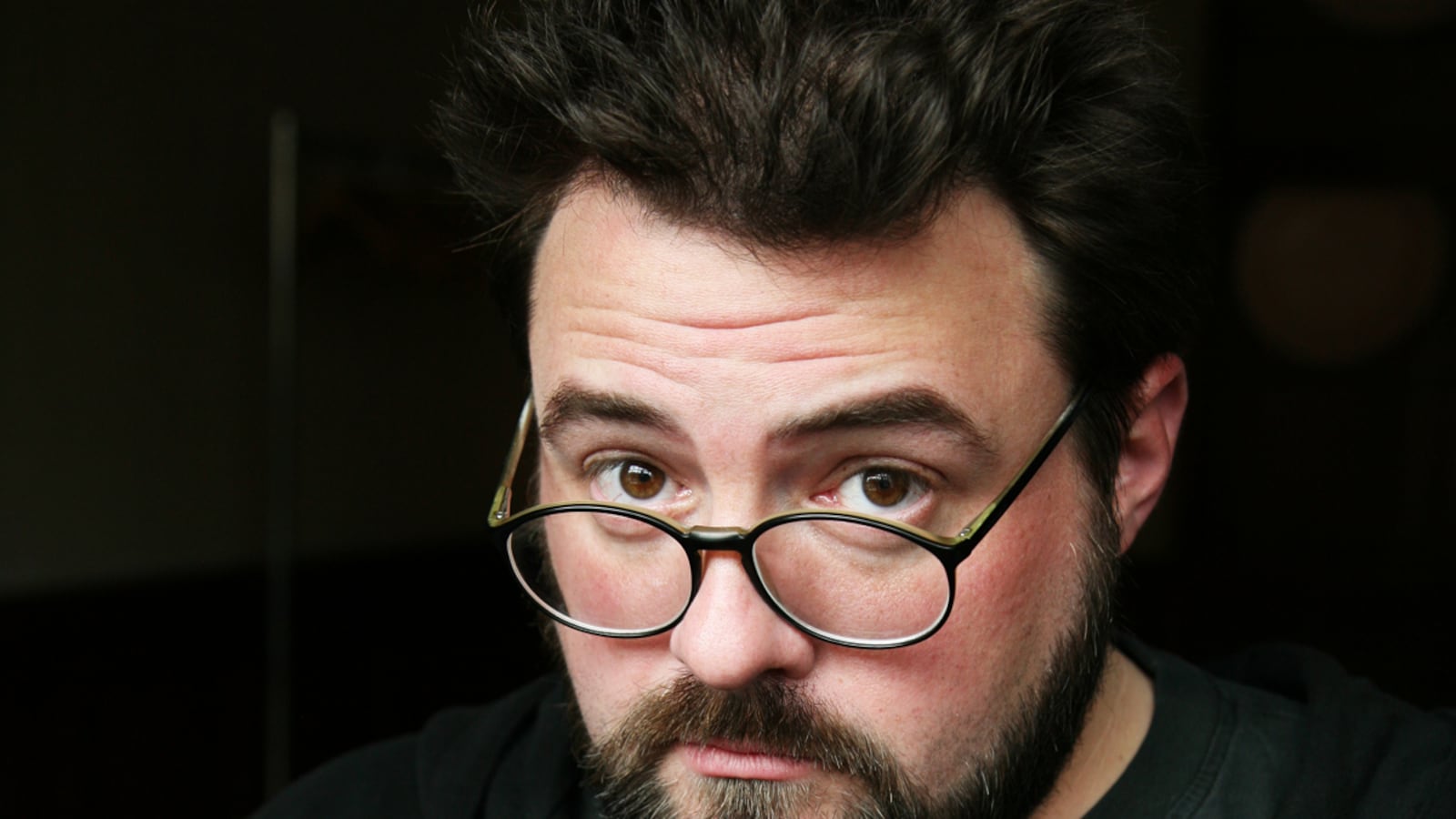You could trace the beginning of the end of Kevin Smith’s movie career to a fateful day in Pittsburgh in 2008, when a lungful of marijuana smoke transformed the writer-director’s professional focus.
The firebrand indie auteur had wrapped his final day of shooting Zack and Miri Make a Porno, the raunchy comedy widely expected to net Smith his first box-office hit after a string of potty-mouthed, bro-skewing movies that never managed to make a dent commercially. Despite his slacker credentials, Smith had never had a pot habit. Until, that is, his Zack and Miri male lead—the world class bud smoker Seth Rogen—convinced the filmmaker to blaze up, tune in, and chill the f--k out.
“He re-energized me in a weird way,” Smith told MTV News. “I became a stoner because of Seth Rogen.”
Zack and Miri flopped. But Smith fondly recalled the transformative bong session that has allowed him to become what he calls a “productive” marijuana aficionado: “I loved who I was. I loved how the inhibition dropped away and I loved just being honest … That dude gave me the greatest gift I’ve had in the last five years.”
Now, after a 19-month run of provocative antics—a headline-grabbing Twitter outburst against Southwest Airlines, the ritual badmouthing of journalists and critics, a blustery film-festival soliloquy, and the lingering “I’m really gonna do this, man” threat that he will retire from filmmaking after his next feature—many industry observers are wondering if Smith has lost the plot.
Worse, those close to the writer-director say his marijuana consumption and categorization of every person in his sphere into friendly or enemy camps, combined with a tendency to sequester himself inside an echo chamber, have resulted in a kind of epic self-sabotage and may have driven him to wash his hands of the film business.

“The pot is something that has everyone around Kevin concerned,” said someone familiar with Smith’s inner circle who asked not to be identified. “He does ‘wake and bake’—he starts smoking the minute he gets up and smokes all day long. It’s like somebody who drinks too much. You wonder if they’re impairing themselves in ways that cause them to not be attentive to important things.”
An indie cinema darling since his 1994 low-budget breakthrough, Clerks, Smith has over the years enjoyed a chummy rapport with journalists, who considered him a straight-shooting iconoclast—a refreshing change of pace in a town full of bullshit merchants. But since February 2010, one of the director’s consuming passions has been a war of words against writers he perceives to be at odds with his agenda. “In Kevin’s world, you’re either with him or against him,” said a source who is on Smith’s payroll but requested anonymity for fear of angering the filmmaker.
When critics clobbered his last movie—the Bruce Willis-starring buddy-comedy Cop Out, Smith’s only director-for-hire offering to date—the director, 41, vented his agitation on Twitter, where he set down new rules limiting reviewers’ access to his movies.
“Realized [the] whole system’s upside down: so we let a bunch of people see [a movie] for free and they shit all over it?” Smith tweeted. “From now on, any flick I’m ever involved with, I conduct screenings thusly: you wanna see it early to review it? Fine: pay like you would if you saw it next week. Like, why am I giving an arbitrary 500 people power over what I do at all, let alone for free. Why’s their opinion more valid? It’s a backward system. People are free to talk shit about any of my flicks, so long as they paid to see it.”
The critical firmament and fanboy intelligentsia rose up in dissent. But that didn’t stop Smith from putting Variety’s Scott Foundas and former Village Voice reviewer Amy Taubin, among other critics, on blast. And he also has dished out his own critical lashings, targeting Deadline’s Mike Fleming, Movie City News’ Dave Poland, and me. (Smith canceled an interview with me last week, his publicist said, because Smith took offense to a story I wrote about the Southwest incident last year.)
Weed consumption aside, the project currently packing Smith’s pipe is Red State, his heavily self-hyped $4 million horror-thriller. The film—a lugubrious jeremiad against Christian fundamentalism and homeland terrorism that’s very different from the director’s previous bromantic efforts—premiered at this year’s Sundance Film Festival. Smith had been pledging for months to his 1.8 million Twitter followers that he would auction Red State to the highest bidder. Instead he railed at studio acquisitions executives from the stage about the evils of mainstream movie distribution before announcing plans to promote self-distribute the movie via a DIY two-tiered approach.
“His rant made Smith seem like a tortured, angry guy,” Mike Fleming wrote on Deadline.com after the film’s first screening.
Since then, Smith has publicized Red State on his various websites, his podcast, and Twitter account. And since March, he has barnstormed North America on a coast-to-coast tour, screening the film in one-night-only, $60-a pop showings at such venues as New York’s Radio City Music Hall, and then sticking around to address the audience afterward.
On Thursday, Red State reaches cable providers via Video on Demand release. Having managed to recover the film’s negative costs on tour, Smith has been writing on his blog about how he “redefin[ed] the theatrical distribution window.”
But according to several sources close to the Mallrats director, his defensive posture and take-all-comers attitude are a direct result of Zack and Miri’s stillborn commercial performance.
“He thought it was going to do $100 million. Kevin went into various stages of depression after Zack and Miri,” said a person who has worked with Smith on various projects over the years. “He gave it his best shot and took the failure really hard. His feelings were hurt, his confidence was shaken, his own personal self-worth went into question.”
Compounding that sense of isolation, Smith is concentrating his energy solely on his existing fans rather than trying to create a broader base for his work. According to some people close to Smith, the choice has cut him off from a much needed reality check.
“If your only relationship with the outside world is with these idolatrous stand-ups, listening to fans talk about how great you are in these chatrooms, you lose perspective on what everybody else thinks,” the source close to Smith’s inner circle said. “If all you do is live in the Comic-Con universe, you don’t get out of it by smoking pot. You gotta go outside and find out what people besides your immediate fan base think.”
That sort of career triangulation seems even more unlikely, however, with Smith declaring that his directorial swan song will be the hockey dramedy Hit Somebody. It’s reportedly a sweeping two-part opus, à la Quentin Tarantino’s Kill Bill, for which Smith aims to reenlist every actor ever to appear in his previous films.
The decision to step away from his day job of the last 17 years, however, has puzzled some associates.
“You don’t turn your back on the business after two failures and expect to be a success,” said one. “Where would Steven Soderbergh or Woody Allen be if they quit after making films nobody went to see? How do you become successful without failing?”
But on his blog in June, Smith presented a rationale for tabling his moviemaking career in a thinly veiled tirade against Deadline’s Fleming, after the writer reported watching Smith “implode” at Sundance.
“What he saw as an implosion was really a simple reinvention: almost a commercial for Kevin Smith 2.0,” the director wrote. “And that commercial worked: in the last six months, I’ve inked deals for a book and two television pilots, started an online radio station, lost 70 pounds, renewed myself as an artist and revitalized my career just in time for me to opt out of the movie biz altogether after Hit Somebody—my next (and last) film.”
So hold on. If Kevin Smith 2.0 turns out to be something more than just a pipe dream, both Hollywood and the entertainment industry’s fourth estate will owe the guy an apology. Big time. Until then, we have much to learn about the strange ways of his productive highs.




